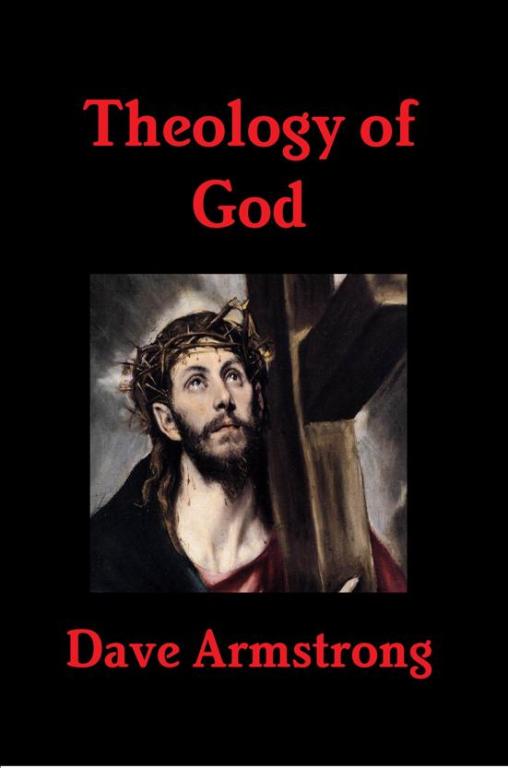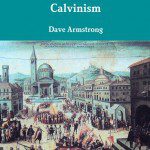[cover design by Dave Armstrong]
— For purchase, go to the bottom of the page —
To the evangelical Protestant “cult watchers” and “cult researchers” (especially the late Dr. Walter Martin): among whom I first began utilizing the Bible in order to refute non-trinitarian heresies such as Jehovah’s Witnesses, Mormonism, Unitarianism, Christian Science, and the United Pentecostal Church, way back in 1981. May your “tribe” increase and flourish.
The doctrine of God remains as supremely important as ever. If we don’t contend for the correct, orthodox, historical teachings of the Christian, Catholic Church: famously formulated at the Council of Chalcedon in 451 (hence my subtitle), why should we spend time defending any theological doctrines?
We can’t afford to get this wrong: our very souls depend on it. St. Paul rebuked the Corinthians early in Church history: “For if some one comes and preaches another Jesus than the one we preached, or if you receive a different spirit from the one you received, or if you accept a different gospel from the one you accepted, you submit to it readily enough” (2 Corinthians 11:4).
Surely, denial of the deity or divinity of Christ and of the Holy Trinity were among the falsehoods condemned by the Apostle Paul as “doctrines of demons” (1 Timothy 4:1). We need to know the biblical basis for these beliefs, and what the Church has taught through the centuries (the “orthodox” theology of God), in view of historic heresies and recent fashionable nonsense such as open theism and process theology.
As is frequently the case in my books, my overwhelming emphasis will be on biblical argumentation: particularly a listing of many scores of relevant passages (systematic theology). The power of the argument for the orthodox theology of God increases exponentially in a cumulative fashion, the more these passages and cross-references are known and understood.
Additional material will attempt to explain these doctrines in laymen’s terms, so that, by the aid of this book, soaked with Scripture, anyone should be able to defend the biblical truths of the Holy Trinity and Jesus as God the Son: the incarnate God.
Table of Contents
Dedication [read above]
Introduction [read above]
I. Orthodox Catholic, Biblical Christology: A Theological Primer
II. A Definition of the Trinity: The Athanasian Creed
III. Jesus is God: Biblical Proofs
1. Direct Statements of Jesus’ Equality with God the Father [read extensive excerpt on Facebook]
2. Creator
3. Eternal and Uncreated
4. Worshiped
5. Omnipotent (All-Powerful)
6. Omniscient (All-Knowing) [read on Facebook]
7. Omnipresent (Present Everywhere)
8. Forgives Sins in His Own Name
9. Receives Prayer
10. Sinless and Perfectly Holy [read on Facebook]
11. Called Lord (Kurios) and God (Theos)
12. 50 Descriptions Applied Both to YHWH and Jesus [read 15 of them on Facebook]
13. Image of the Invisible Father
14. Primacy of the Name of Jesus
15. Claims to be the Messiah (Christ)
16. YHWH, the Messiah, and Jesus: Six Parallel Attributes
17. 50 Old Testament Messianic Prophecies Fulfilled
18. Jesus’ Subjection (as Messiah) to the Father
IV. The Holy Trinity: Biblical Proofs
1. The Unity of God and Monotheism
2. 40 Passages with All Three Divine Persons
3. The Holy Spirit: 40 Personal Attributes
4. Deity of the Holy Spirit: Direct Biblical Evidence
5. 12 Descriptions Applied to All Three Divine Persons
6. Circumincession / Perichoresis: the Indwelling of the Three Persons in One Another
V. Is Christ’s Knowledge Limited? Some Proposed, Supposed Exegetical “Difficulties” Examined
VI. Impeccability: Could Jesus Have Possibly Sinned or Succumbed to Temptation?
VII. Biblical Evidence Against Monothelitism (the Denial of Jesus’ Two Wills: Human and Divine)
VIII. Is God Outside of Time? [read excerpts on Facebook]
IX. God’s Immutability: Can God Change His Mind?
X. The Simplicity and Self-Sufficiency of God
XI. Biblical and Patristic Evidence for Anthropomorphism and Anthropopathism (God Condescending to Human Limitations)













